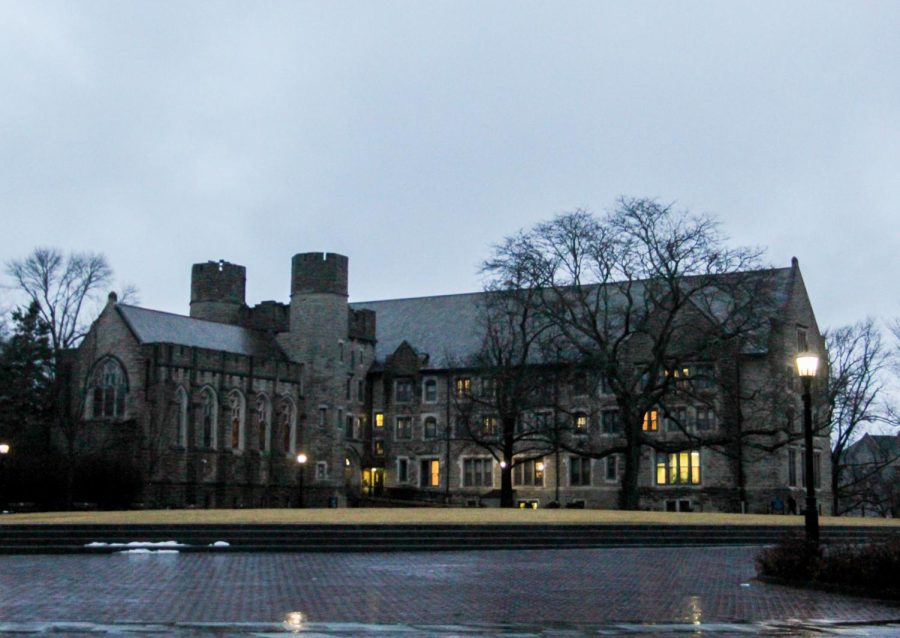CLAS Core Curriculum: Requirement or Burden?
Courtesy of Peter Licopantis/Villanovan Photography
It is time to reevaluate the CLAS core requirements.
March 24, 2022
The most wonderful time of the year is upon us: course registration. Students schedule their weeks around specified course registration time slots, which are followed by either loud exhales of relief or frantic searches for different class times.
Here’s the catch: when planning out semester courses ahead of time, students in the College of Liberal Arts and Sciences have a little more difficulty.
On top of taking the required courses for their majors and minors, CLAS students also must factor in the 20 extra core curriculum courses that they have to take as an Arts and Sciences student.
The two natural science requirements are only achieved by taking specified lab courses, for which each student must attend a three-hour lab once a week. Even if someone were an English major, they would still have to take time out of their schedule to factor in the difficult lab requirement.
On the flip side, history and English courses are also required, even for Chemistry majors. There is nothing wrong with the diverse experiences CLAS students uniquely achieve through these courses, but they are difficult to wedge into the already busy schedules of students who may be solely interested in one major.
The requirements do not stop at the number of extra credits students are supposed to obtain. They go beneath the surface within the “Core Attributes” section of each course.
For instance, students looking to study abroad might think that they could achieve their history requirement while they are abroad in a place rich with ancient history like Europe. However, the history requirement is only attainable here at Villanova.
Freshman Elle Fallon is a Communication major in CLAS who is also obtaining a Business minor through the Summer Business Institute. With her interest in Communication, she expressed how it is difficult to fully enjoy her major when she has to make sure certain required courses fit in her course load as well.
“An essential aspect of a Liberal Arts education is being well rounded, and I believe some required courses such as Ethics are reasonable,” Fallon said. “However, CLAS is so broad that many of the requirements have very little relevance to an arts major like myself.”
She specified that certain courses do not pertain to her academic or professional interests, serving as more of an inconvenience than a benefit in her class schedule.
“Personally, science is not my forte, and it is frustrating that I am required to take two science courses while I could be taking classes that count towards my major and that I am genuinely interested in,” Fallon said.
“I don’t know why students are required to pay for classes that hold no significance to their major/interests.”
Many students express this same type of dilemma while selecting courses and planning for upcoming semesters. This often results in taking courses that “double up” in core attributes.
Unless students find a way to hack the system and find certain classes that count for their diversity, equity and inclusion and their fine arts requirements, for instance, then it will be extremely difficult for them to find manageable times to add the required courses for their majors into their schedules.
If multiple-attribute DEI courses are taken just to fulfill certain credits rather than taken as a tool to increase worldly knowledge and awareness, their meaningfulness decreases and they are seen as a burden rather than a positive opportunity.
On that note, I find it overwhelmingly important and positive that DEI courses are required for CLAS students. However, why are CLAS students the only students in the school required to take these courses?
Although students in the Business, Engineering and Nursing schools have enough requirements as it is, there is a reason that these students chose this liberal arts university that boasts a diverse, holistic curriculum.
Especially in fields like business, engineering and nursing, the ideas discussed in Diversity, Equity and Inclusion classes are more relevant than ever.
Even implementing the requirement of just one DEI course could be beneficial for these students and could help emphasize Villanova’s core values of Veritas, Unitas and Caritas.
Making core requirements like DEI more standardized across the colleges and reassessing the CLAS core curriculum in particular to better suit students’ interests would greatly benefit Villanova students. Required classes in the College of Liberal Arts and Sciences and across the University should serve to enrich, not to burden.


